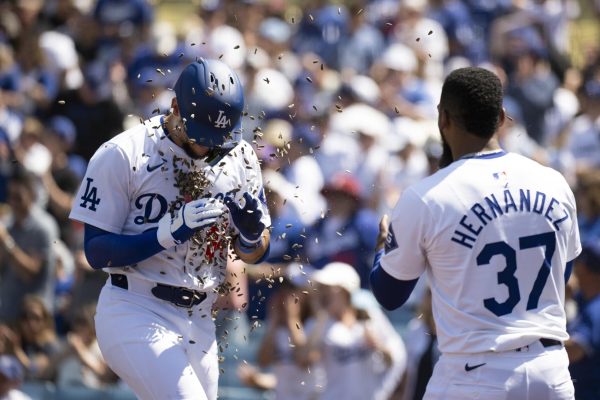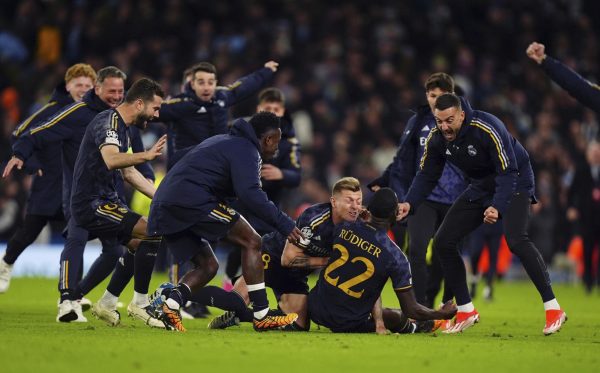Opinion: The NBA’s Double Standard
On Monday, Feb. 15, the Cleveland Cavaliers made a visit to San Francisco to take on the Golden State Warriors. The Cavaliers’ best player, Andre Drummond, has quietly put together a very solid NBA career while playing on mediocre teams, both in Detroit and Cleveland. This year, Drummond is averaging almost 17 points and 14 rebounds per game for the struggling Cavaliers and is seen as one of the most physical forces in the league.
However, against the Warriors, Drummond showed up to the game in street clothes and was a healthy scratch as he watched his team lose by 31 to Golden State. This was a clear, strategic decision by the organization, who has recently decided that they are going to trade Drummond this season. In fear of an injury to Drummond that would diminish his trade value, the team has elected to shut him down until they find a suitor.
To be completely honest, I follow the NBA religiously and I had not even noticed this before Feb. 15. I was aware that the Cavaliers were most likely going to move Drummond, but I was unaware that they had shut him down. What brought it to my attention was Draymond Green. The Warriors forward, who has never been afraid to loudly display his opinions on all topics, sounded off in his press conference after the game about the situation.
“As a player”, said Green, “you are the worst person in the world when you want a different situation. But a team can say they are trading you, and that man has to stay in shape, he has to stay professional, and if not, his career is on the line. At some point, the league has to protect the players from embarrassment like that.”
This has been seen recently, with players like Anthony Davis and James Harden receiving immense criticism and sometimes fines from the league for openly wanting trades and forcing their way to a different team. Green understands this, however he is frustrated with the fact that when it is the other way around, like the Drummond situation, organizations are given the freedom to operate on a different level, from the media, fans and the NBA.
Immediately after watching the video, I went to the comments to see people’s reactions. I thought Green made some strong arguments, and I began to ponder the idea of a double standard in the league as he was saying. However, as I quickly discovered, I seemed to be in the minority. The comments were filled with common sayings when a professional athlete passionately speaks his opinions on a type of injustice, “gets paid millions to play a game,” “why is he always talking?” and “if you don’t like it then don’t play.”
What I don’t understand is why so many people feel so personally attacked by an athlete speaking their mind. Yes, Draymond Green plays a game and is compensated greatly for it. Why? Because he is one of the best in the world at what he does, and he brings in an immense amount of revenue. I see nothing wrong with the sentences I just wrote, but for some reason that last sentence, in the eyes of many, should restrict professional athletes’ ability to speak about the unfairness they see in their workforce.
Is there a double standard in the NBA? I don’t know, I (obviously) don’t have first-hand experience in the association. After Green’s comments however, players like LeBron James, Dwyane Wade and Shaquille O’Neal were quick to come to his defense. “Organizations get a pass,” said Wade, “players get castrated.” Fans and the media will most likely look at what the Cavaliers are doing now as “what is best for the team,” however if it were the other way around and Drummond was trying to push himself out of Cleveland, he would be considered selfish.
This is an incredibly layered and complicated subject that I do not have time to fully unpack in this article. But Green’s comments, and the subsequent comments that have been made in defense of him, made a lot of sense to me as an avid fan. I was one of those people who mocked James Harden as he mailed it in during his last days in Houston, or scoffed at Kyrie Irving and called him a “cancer” as he has struggled in Boston and Brooklyn. Perhaps I will look at the other side of the coin more often now, and I think you should too.











James S • Feb 26, 2021 at 7:31 pm
There’s no double standard.
There’s a obvious difference between benching Drummond the continuing to pay his full salary and James Harden basically not playing while collecting his paycheck.